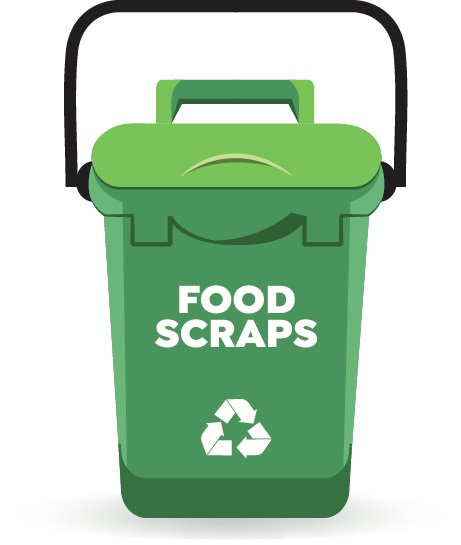Food Scraps Bin | Para Kai
Our new rubbish and recycling services includes a handy food scraps bin | para kai.

What can go into this bin?
✓ Fruit & vegetables
✓ Meat & seafood
✓ Bones
✓ Coffee grounds
✓ Bread, rice and pasta
✓ Cooked food
✓ Dairy
✓ Egg shells
What can't go into this bin?
Any of the following items will contaminate our composting process:
✖ Garden or pet waste
✖ Hard seafood shells, eg mussel and oyster shells
✖ Plastic
✖ Liquids
✖ Tea bags
✖ Tissue, paper, newspaper, paper towels or cardboard
✖ Bags or bin liners of any kind
When is the food scraps bin | para kai collected?
The food scraps bin | para kai is collected weekly. Check out your collection schedule.

Please note: when you put your food scraps bin kerbside, please 'lock' it by putting the handle upright.
How is it paid for?
All of your food scraps collection is paid for through a solid waste targeted rate. This makes it easier for all households to participate in waste reduction, resulting in less household waste going to landfill.
Can I put paper towels, tissues or cardboard in the food scraps bin?
No, only food scraps can go in your food scraps bin. Tissues, cardboard and paper towels would contaminate the end compost product.
Per- and polyfluoroalkyl substances (PFAS, including PFOA and PFOS) can be found in fibre-based products as well as in recycled paper and cardboard. Fibre-based products means products primarily made from wood fibre (paper or cardboard) or other types of biomass (bamboo, rice, sugarcane, potato starch, etc).These PFAS can then accumulate in the soil, plants and consequently the food chain.
Newspaper and cardboard can also introduce contaminants such as inks that include heavy metals and/or microplastics.
Some paper and cardboard items can still be diverted from landfill through our kerbside recycling. These include: pizza boxes with food scraps removed, cardboard (including egg cartons) and newspaper.
What about compostable or biodegradable products?
‘Compostable’ packaging (including compostable liners) cannot go in your food scraps bin. They do not break down at the same pace as food waste in the hot compost system we are using.
Some compostable materials also contain substances of concern (such as PFAS). Aotearoa New Zealand currently has no standard for what can be labelled as compostable packaging.
Compostable packaging can leave microplastics or other contaminants to accumulate in compost, soil, plants and animals, in some cases negatively affecting their growth.
Any compostable packaging can be put into your red rubbish bin.
Can I put a liner in my bin?
No, only food scraps can go in the food scrap bin. Our processing facility does not accept any type of liner.
Paper bags are often mixed with polyester to strengthen them. Any inorganic material would contaminate the end compost product.
So-called ‘compostable’ bin liners also contain plastic, and pose a problem contaminating the hot compost. Some districts are using bin liners because their food scraps are not composted, but instead put into an anaerobic digester, which is quite different.
See above for more details on the individual products that cannot go in food scraps bins and why they are excluded from collection.
If you are having trouble cleaning the food scraps bin, we recommend freezing the food scraps until collection day, or putting a small amount of water in the bottom of the bin to loosen your waste.
I don't need a food scrap bin because I compost my food waste
Home composting is great, and if you're already doing this, we encourage you to keep doing it!
The food scraps bin can still be used for things that don't go in your compost bin (like meat scraps, bones, eggs shells, bread crusts etc) and for things that don't compost well (like citrus scrap, fruit stones, corn cobs etc).
How can I stop my bin from smelling?
The best solution that many already using this service from around the country have found is making some space in your freezer and freezing the food scraps until pick-up day each week. This minimises smell and clean up.
If you are putting food scraps directly into the bin make sure to store it somewhere cool and shady.
It's a good idea to give your bins a quick rinse after collection as well.
There are also some products available to deodorise your bins, including natural options like: tea tree oil, cloves, borax, lemongrass and witch hazel. Just pour a capsule into your bin before putting in food scraps.